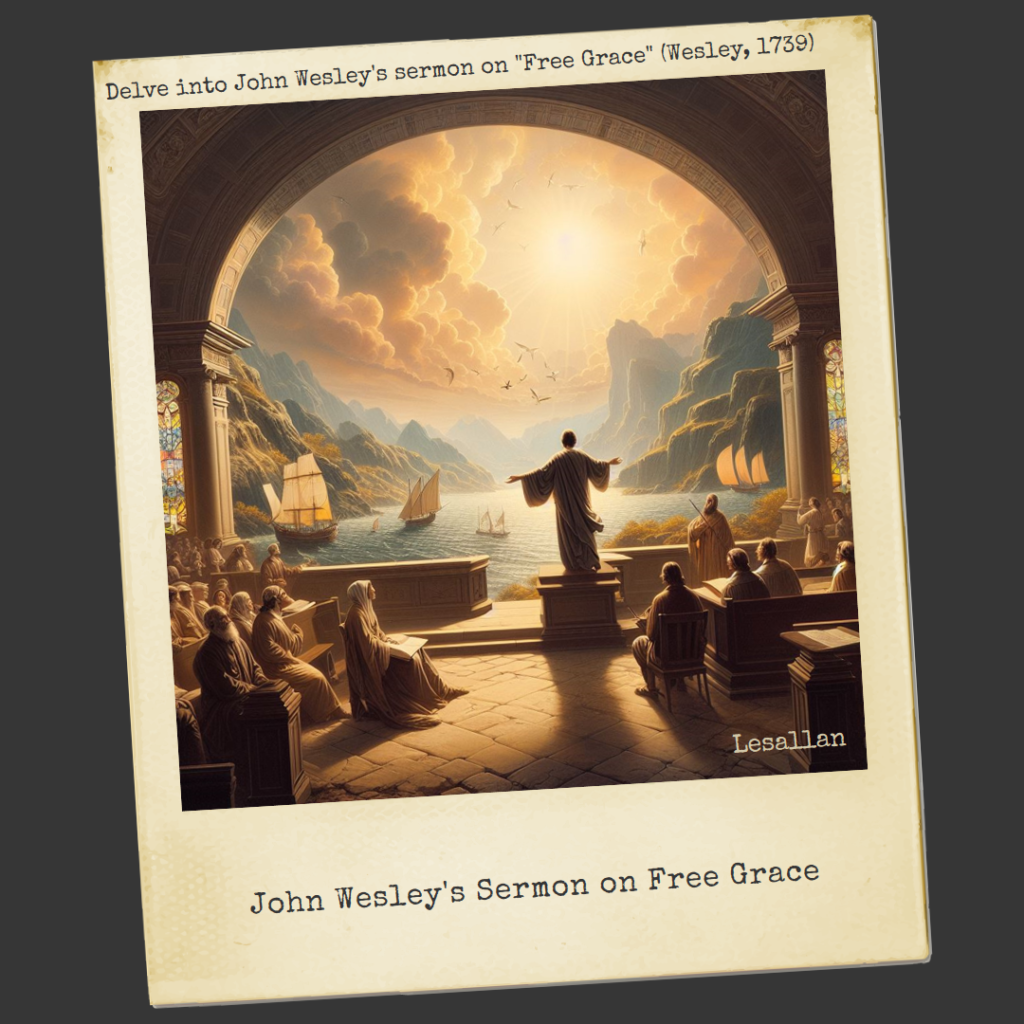Written by Lesallan
Ohio Christian University
THE3360 Theology of John Wesley (ONLSP24)
Dr. Steven Gerig
January 21, 2024

John Wesley on Free Grace – The Sermon
In theological discourse, few topics are as contentious as the doctrine of predestination. This paper delves into John Wesley’s sermon on “Free Grace” (Wesley, 1739), a compelling argument against this doctrine. Wesley (1739), a renowned theologian, challenges the notion of predestination, asserting that it contradicts the loving nature of God and the testimony of Scripture (Wesley, 1739, p. 5). This paper aims to comprehensively analyze Wesley’s sermon, exploring his interpretation of Scripture, his use of reason and experience, and his views on the universal scope of God’s grace and the conditional nature of salvation. This paper will comprehensively analyze John Wesley’s sermon on “Free Grace” (Wesley, 1739), focusing on his argument against the contentious doctrine of predestination. It will explore Wesley’s interpretation of Scripture, his use of reason and experience, and his views on the universal scope of God’s grace and the conditional nature of salvation, asserting that the doctrine of predestination contradicts the loving nature of God and the testimony of Scripture. The aim is to shed light on Wesley’s theological perspective and contribute to the ongoing discourse on predestination in theology.
In his sermon on “Free Grace,” John Wesley (1739) argues against the doctrine of predestination, which holds that God has predetermined who will be saved and who will be damned (Wesley, 1739, p. 7). Wesley contends that this doctrine contradicts the nature and character of God, who is love and desires all people to be saved (Wesley, 1739, p. 8). He also claims that this doctrine contradicts the testimony of Scripture, which affirms that God offers grace to all and that humans have free will to accept or reject it (Wesley, 1739, p. 10).
Wesley (1739) interprets Scripture using the King James Version to emphasize the universal scope of God’s grace and the conditional nature of salvation. He uses passages from the Old and New Testaments to support his case, such as Ezekiel 18:23, John 3:16, 1 Timothy 2:4, and Revelation 22:17 (KJV). He also appeals to reason and experience to show that predestination is inconsistent with the moral law and the witness of the Spirit (Wesley, 1739, p. 15). Wesley concludes that free grace is a glorious and comforting doctrine that honors God’s justice, mercy, and truth and that invites all people to repent and believe in Christ (Wesley, 1739, p. 20).
Wesley’s sermon is a powerful and persuasive defense of Arminianism, which affirms human free will and universal atonement. He demonstrates a deep knowledge of Scripture and a logical method of interpretation. He also shows a pastoral concern for the spiritual welfare of his hearers, who might be discouraged or deceived by the doctrine of predestination. However, his sermon also has some weaknesses, such as his tendency to caricature Calvinism as a harsh and cruel system that makes God a tyrant and humans passive robots. He also does not address some Biblical passages that seem to support predestination, such as Romans 9, Ephesians 1, and John 6. He also does not fully explain how human free will is compatible with God’s sovereignty and foreknowledge. Therefore, while his sermon contributes to the debate on free grace, it is not without flaws or challenges” (Wesley, 1739).
John Wesley’s sermon on “Free Grace” presents a robust defense of Arminianism, emphasizing human free will and universal atonement. Despite its strengths, including Wesley’s deep knowledge of Scripture and his logical method of interpretation, the sermon has weaknesses. Wesley’s tendency to caricature Calvinism and his failure to address specific biblical passages that seem to support predestination are notable shortcomings. Furthermore, he does not fully reconcile human free will with God’s sovereignty and foreknowledge. Despite these challenges, Wesley’s sermon contributes significantly to the theological debate on free grace, inviting further exploration and discussion (Wesley, 1739).
References: Wesley, J. (1739). Free Grace. The Wesley Center Online. Retrieved from http://wesley.nnu.edu/john-wesley/the-sermons-of-john-wesley-1872-edition/sermon-128-free-grace/


